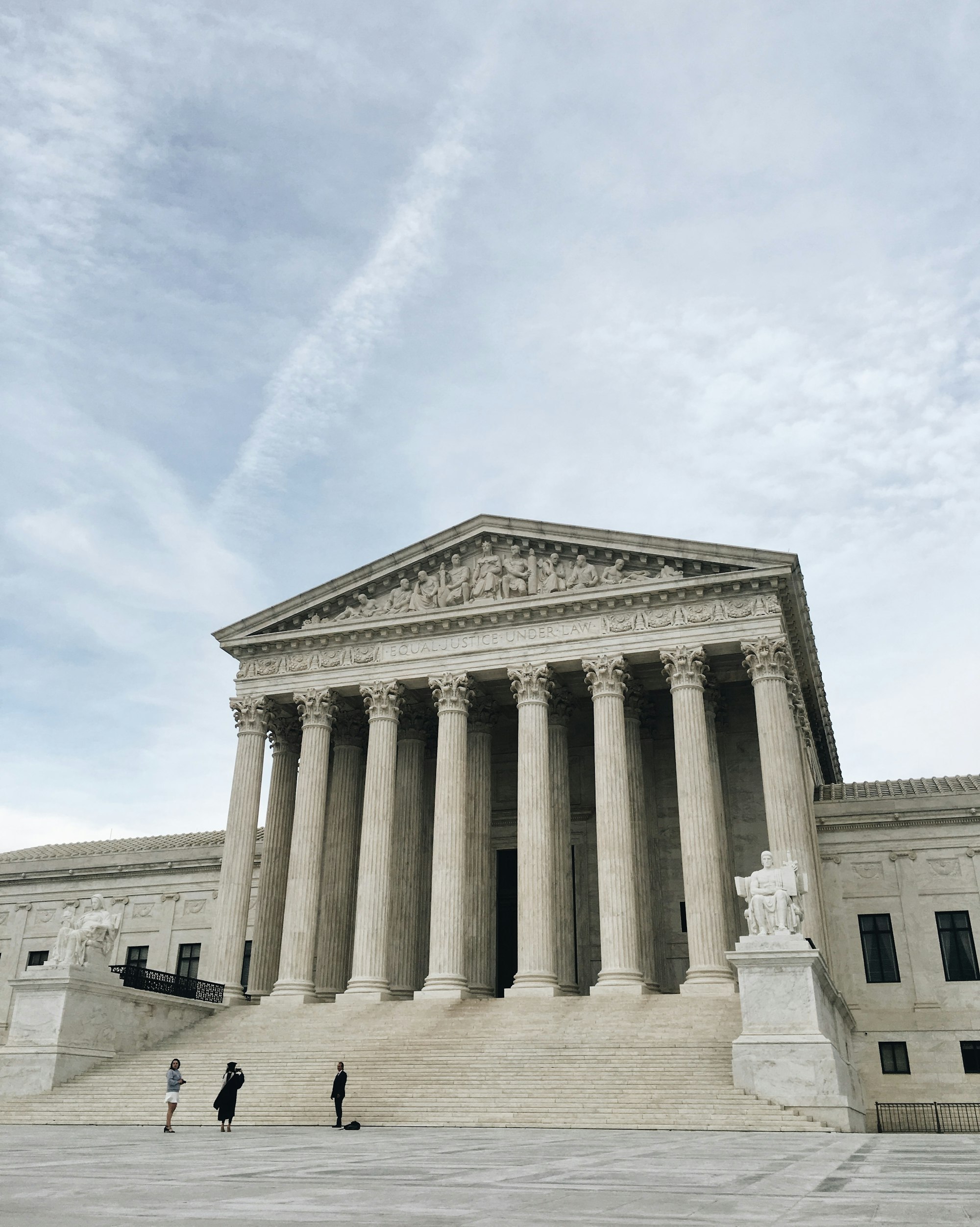On Neoliberal Comforts and Theopolitical Problems: A Conversation with Asher Wycoff
You'll learn a lot listening to Asher Wycoff. I certainly have, and I learned that much more through this e-mail conversation.

You'll learn a lot listening to Asher Wycoff. I certainly have, and I learned that much more through this e-mail conversation. He makes complicated readings and ideas in political theory digestible for everyone, including me.
Asher is a PhD candidate at the CUNY Graduate Center writing his dissertation, Numbered, Weighed, Divided: Revolution and Apocalypse in the Modern Liberal Tradition. I would be remiss if I didn't mention the comics he's drawn or his publications.
Below, we've spoken about Susan Sontag, the Supreme Court, what is "political," and Martin Buber's "theopolitics."
AK: I want to start by crediting you for getting me to read Susan Sontag's Regarding the Pain of Others. The ideas of the book keep cropping up every time I try to think through why the world is such a mess. How do ethics and aesthetics link? Sontag talks at length about how one person might see carnage where another sees victory. I'm curious about what you've gotten from her reflections and how teaching the book has changed or deepened your perspective.
AW: It's a great little book! What I find especially valuable about Regarding the Pain of Others is precisely that question of interpretation; photographs don't "speak for themselves." I assigned the book as part of a unit on framing and discourses, if memory serves. This would have been in Spring 2020, just before the pandemic, when there was already this frustrating discourse around "misinformation" that I was hoping to get students to think more carefully about. There are no purely impartial media outlets that report just "the facts." Every outlet has to determine what it's reporting, to whom, and how, and you need a decidedly partial editorial perspective to make those determinations. What Sontag tells us about journalistic photographs in particular is true about the reporting of facts generally: these are discrete pieces of information, frozen moments of a world in process, that only take on meaning when we thread them into a particular narrative.
On that note of victory, one of the examples I remember dwelling on in class was Raising a Flag over the Reichstag, which was very deliberately composed and directed, but like all such photographs it conceals the subjectivity that constructs it. It's a propaganda image, but this doesn't mean it's false; it's mobilizing an historical fact (the Soviets defeated the Nazis at the Battle of Berlin) for an ideological purpose. Nor is it inauthentic, any more staged or curated than most war photographs. Looking to photographs for the pure moment without artifice, that aesthetic fetish for authenticity is what's dangerous. The second you think you've found something immediate, raw, unfiltered, that's when you're really in trouble.
AK: An "aesthetic fetish for authenticity" is really interesting to think about. Is it a major driver of our political and social lives? I guess in terms of political life, there's Trump, reconstructed in so many eyes as "everyman" when he's anything but. I'm playing with this idea: unfiltered hate comes across as authentic and truthful in part because of its immediacy. Even those of us who want to get rid of all the anger in our lives have to concede that a crazy uncle saying whatever he wants wields a lot of power. We're all responding to that guy, and a politics of bullying a nation, by extension, feels relatable and more real for a number of us.
This brings us to the issue of centrists or normies. As we're having this conversation, the White House has said protesting a Supreme Court Justice of highly questionable legitimacy is a non-starter, even when he's from the opposing party and has dedicated himself to taking away rights from half the country. I'm wondering. What is authentic for the White House? What's authentic for the normie mindset?
AW: I think you're absolutely right about the perception of immediacy thing. It's only natural to trust your gut reactions, or to respond positively to an authority figure who validates them. But of course, our immediate reactions to social phenomena, or (re)presentations of them, are socially conditioned. And that's some of the value in that Sontag book for me, prodding the reader to question any reading that seems immediately obvious to us. Why does it seem immediately obvious, and would it seem the same way to somebody else?
This definitely has bearing on protest, too. One thing you notice with mainstream liberal commentary is this tendency to elevate gut reactions to certain forms of protest to general laws of decorum: it's never appropriate to protest outside a public official's home. Particularly perplexing is the suggestion that confronting public officials directly is "anti-democratic," even when said officials are unelected and de facto unrecallable. The "authenticity" in question I suppose is this notion that the Supreme Court is a neutral institution, above the fray of partisan politics, and that any institutional change to it or social pressure upon it compromises its mission. This is basically what we're hearing from the White House, "normies," and Clarence Thomas. The "authentic" Court is a dispassionate one. But courts are political institutions, they're subject to political pressures, and in the US they quite literally make policy. This isn't unique to liberals, either, to be clear. It's behind the long-standing conservative complaints about "judicial activism" and Roe v. Wade being a "poorly-reasoned" decision. The reflexive feeling that many Americans have toward the Supreme Court is out of step with the reality, and the discrepancy should invite us to question why that's our immediate disposition.

AK: Agreed. The image of the Court—the Court as a mythical, aesthetic object—is the problem. It's "above the fray" in people's minds, and a not insignificant part of the problem goes beyond "rah rah America" cheerleading. The problem lies in the reasoning of classical liberalism. The idea behind the Court seems to be that it will help preserve Constitutional form, that the executive won't grab too much power or Congress will dominate the states or whatever. It's supposed to guard against wild distortions of the document. And this notion of Constitutional form, I think one can say, is already defunct the second there's a Bill of Rights in addition to the Constitution of 1787. With the first 10 Amendments, there's a Constitutional culture with a life of its own, and the scope of things the Court must address is destined go well beyond disputes between various branches of government or unclear legislative text.
This is a consistent problem with Enlightenment thinkers. They want to say that it is possible to reason about political and social life without addressing how traditional sentiments operate or radicalize. They almost outright say you just have to pay attention to power and what's useful, that all the other stuff--in the case of the US, literally slavery--will sort itself out.
So it looks like we need more tools to think about politics. I mean, we need more just to recognize what's happening. A more rigorous sense of how history works, perhaps, or a look at why class is so durable. Or aesthetic considerations. I'm curious to hear how your sense of what is properly political has expanded over the years. For myself, I had a pretty good sense the personal is political, but I didn't realize until recently how deeply true that is.
AW: That's a very comforting liberal idea, isn't it? If you set out the rules and enforce them consistently, everything else will sort itself out. Hayek makes that precise argument about chattel slavery in The Constitution of Liberty, if I remember correctly. It was the liberal principles of freedom of speech and association that enabled abolitionists to triumph over the democratic majorities of the South who would have upheld slavery in perpetuity. Slavery is eventually abolished because liberal principles were consistently enforced. An indefensible argument on all sorts of historical grounds, of course, but that Enlightenment expectation of indefinite, rational progress definitely persists in the "rules of the game" genre of neoliberalism.
I'd like to approach the "what is political" question from this angle, because it's popular in a certain strain of left criticism to describe neoliberalism, or even liberalism generally, as anti-political or "depoliticizing." Sometimes this is a helpful framework. "The personal is political," is making this kind of gesture. There are these features of our everyday lives that we take for granted or see as neutral, that really are exercises of power. We've been "depoliticized" insofar as we've been conditioned not to recognize these structures of power as such. This was the whole idea behind feminist consciousness-raising groups, political education in socialist parties and trade unions, and the like: get people to recognize that the ubiquity of interpersonal violence or exploitation isn't just an accident of fate, but the result of structural forces. So to say "the personal is political" is a demand to introduce these issues that have been relegated to the private sphere to public contestation, and that's often been necessary.
There's a tendency now among certain "left" commentators, though, to suggest that the personal is never political. The general tendency toward more individualized forms of political engagement, which in some accounts we have seen across the Global North since 1968, is discussed as a destruction of "the political." That is, any retreat from disciplined, collective organization is a retreat from politics generally. Along these lines, there's an argument I've heard in half a dozen Jacobin columns, too, that events like the January 6 riot or more diffuse episodes of stochastic violence are "anti-political." In these uses, "anti-political" is just a synonym for "disorganized," and I don't think it clarifies much of anything.
So where I start to have trouble is when we start using "anti-politics" or "depoliticized" in pejorative senses, as if there is some determinate, transhistorical content to "the political." There isn't. What prerogatives which political actors can justly exercise is an ongoing matter of contestation. When we complain that something is "antipolitical," we tend to mean that someone has power that they shouldn't, and that someone else doesn't have power that they should. The 1990s, for instance, wasn't a "post-political" decade; it was a decade of particularly strong (neo)liberal hegemony. The most responsible uses of these concepts recognize this. When Wendy Brown or Antonio Vázquez-Arroyo, e.g., uses "antipolitics" or "depoliticization" in reference to neoliberalism, it's usually clear they mean the privatization of public prerogatives or the demobilization of the working class, respectively. Even there, though, I'm not sure marking out authentic boundaries of "politics" is the most helpful way to address what's happening.

AK: One of the challenges for those of us doing political theory is being able to work with "politics" as the facts on the ground and "politics" as aspirational and/or theoretical. Like you say, there are some concepts of politics that are helpful, including a definition of "anti-political" where people are conditioned "not to see structures of power as such." It's hard to see how anyone could make a real decision about anything if they're profoundly misled regarding the basic forces governing their lives. (On this note, I just got a message from an old acquaintance about how much better Twitter was going to be with Musk in charge.)
I'm wondering how you balance this in your own work. You've written on Buber's vision for Israel and socialism, his not-unsubtly labeled "theopolitics." I guess one can say that by articulating the problems with it, it's possible to reach a balance between the two notions of politics we theorists have to work with. I'm curious to hear how your thinking progressed over the course of the paper.
AW: Martin Buber was absolutely trying to reconcile two concepts of "politics" in the sense you describe it—the "is" and "ought" problem, if I can be a little crude about it. Buber you could fairly call "antipolitical," in the sense that he explicitly calls for a "supersession of the political principle by the social," and he argues that all socialists are doing this, just in different ways. His socialist vision is functionally agrarian Labor Zionism. He sees the kibbutzim as the model for a federation of autonomous, self-governing communes, and he argues that this kind of governance is our way out of capitalist atomization, to reverse the destruction of "the social" by "the political" and "the economic." It's about repairing the relationships of individuals to one another, and by extension to God. It is only in the concrete experience of community worship that we authentically encounter the divine, says Buber.
That's really the point of socialism and Zionism for him. He wasn't enthusiastic about a dictatorship of the proletariat or a Jewish state. His priority was returning the Jewish people to an experiential, enthusiastic relationship to God. In his own elaborate, curious system, he sees libertarian socialism as the natural social-political form to foster this kind of religious life. This is the "theopolitics" idea—Buber's utopian gesture toward a "direct theocracy," communal self-governance, but grounded in a living relationship to the divine.
The term "theopolitics" is a pointed inversion of Carl Schmitt's "political theology," which conceives divine power (and the state as a secularized form thereof) as something utterly external and alienated, able to impose its will on the people without restriction. Buber very much belongs to this interwar German milieu, with its ubiquitous romantic critique of bourgeois atomization, that contemporary political theorists, myself included, borrow many of our guiding concepts from. He's deeply indebted to Weber, and he sees a lot of his exegetical work as complementing Weber's—Weber did the "sociology of religion," so Buber is going to do the "religion of sociology." There's this stylized version of the "disenchantment of the world" idea that socialists like Buber and Benjamin (and fascists like Schmitt, for that matter) take to heart in the Weimar years, but they attenuate it with what Norbert Bolz calls the "exodus impulse." They don't resign themselves to the iron cage; they demand a way out. So there is politics as "facts on the ground," which is horrible, and then there's some style of revolutionary politics, which is our way out.
Buber states flatly in Paths in Utopia that all socialist politics is secularized eschatology. That socialists encounter the world as fallen or broken, and take it upon themselves to redeem it. Usually you encounter this statement as a criticism of socialism, that it's suffused with messianic delusions—you hear this from Hayek, Keynes, Rothbard, Norman Cohn, François Furet, John Gray, etc. But for Buber, and for many of the post-Cold War socialists who draw inspiration from their interwar German counterparts, this is the whole point. Aspirational, normative politics is a project of "this-worldly" redemption. I'm committed to this idea to some extent myself, though it runs serious risks when it comes to accounting for political events and processes descriptively.
AK: That's a beautiful answer, and I feel this is an unusual compliment to give, but it takes into account a lot. To make that compliment a bit clearer: as you mention, there are critics who want to argue that whatever they don't like is a false religion. So a number from the Right say that Marxism is a warped take on Providence, for example. In my experience, these sorts of takes can be detailed, but they do not take into account very much. They're screeds, not serious attempts to grapple with another's vision. The way you describe Buber's thinking, I'm wondering about how he conceived the disabled or the elderly in labor communes. I've seen it argued that "I-Thou" is far more expansive than assigning people value in terms of intellectual or manual labor, and this could be a helpful notion nowadays. America is horribly ableist. Where exactly do you turn when your brain and body refuse to do what you need?
Anyway, last question: What are you reading and working on currently? What projects can we look forward to, what should I get ready to hype and boost?
AW: The aging and ability question is a good one. I do think Buber's dialogic vision attenuates one risk of libertarian socialism: lapsing into rugged individualism, just with shared accommodations. A crucial point of the I-Thou relation is refusing the instrumentalization of others. To value another only for their labor is to reduce them to an It, and this is what capitalism ultimately does to all human beings, per Paths in Utopia. It's not the book's central focus, by any means, but it is clear that care for the vulnerable is an essential part of the "renewal of society," as Buber calls it. Many of his warnings ring true with the profound and cruel disregard for the elderly and disabled we've seen over the past two years. I was revising that article for resubmission at the beginning of the pandemic, and the more catastrophic themes of it felt a little close for comfort at times.
I don't have much to plug! Slouching into the summer here, I'm mostly dissertating. The project is about the analogy of revolution and apocalypse, so the Buber article is something of a bonus track to it. The basic argument is that what we call "the liberal tradition" can be read as a counter-eschatology, a sustained effort to rationalize apocalyptic discourses. I'm reluctant to describe it beyond that since it's a complete mess at the moment, and I plan to spend the next three months (or more) fixing it. Otherwise, I'm trying to read some of the Great Books I've never gotten around to while I still have the luxury of time. I finally read The King's Two Bodies, which I'd had on my bookshelf for probably four years, and which has compelled me to try to learn a little Latin.
